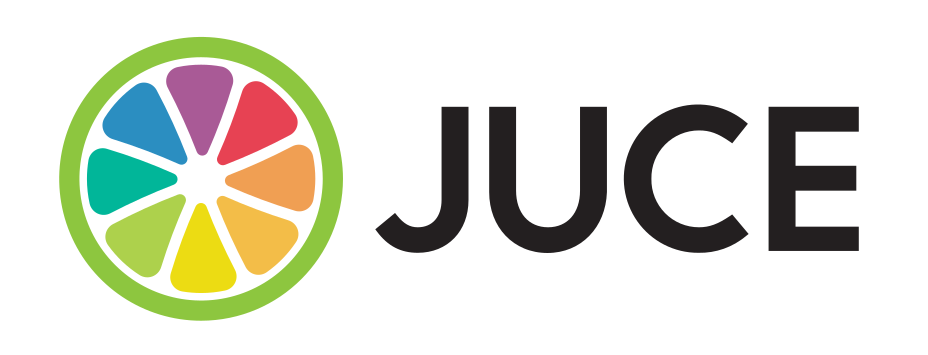JUCE alternatives and similar libraries
Based on the "Frameworks" category.
Alternatively, view JUCE alternatives based on common mentions on social networks and blogs.
-
OpenFrameworks
openFrameworks is a community-developed cross platform toolkit for creative coding in C++. -
Cinder
Cinder is a community-developed, free and open source library for professional-quality creative coding in C++. -
libPhenom
DISCONTINUED. libPhenom is an eventing framework for building high performance and high scalability systems in C. [Apache2] -
ffead-cpp
Framework for Enterprise Application Development in c++, HTTP1/HTTP2/HTTP3 compliant, Supports multiple server backends -
LibU
LibU is a multiplatform utility library written in C, with APIs for handling memory allocation, networking and URI parsing, string manipulation, debugging, and logging in a very compact way, plus many other miscellaneous tasks -
Loki
Loki is a C++ library of designs, containing flexible implementations of common design patterns and idioms. -
XPLPC - Cross Platform Lite Procedure Call
Cross Platform Lite Procedure Call - Support Linux, macOS, Windows, iOS, Android, Web Assembly, Flutter, Kotlin, Python and More -
Windows Template Library
A C++ library for developing Windows applications and UI components. [Public] -
GLib
GLib provides the core application building blocks for libraries and applications written in C. [LGPL] -
ROOT
A set of OO frameworks with all the functionality needed to handle and analyze large amounts of data in a very efficient way. Used at CERN. [LGPL] -
Reason
A cross platform framework designed to bring the ease of use of Java, .Net, or Python to developers who require the performance and strength of C++. [GPL2] -
Cxxomfort
A small, header-only library that backports to C++03 some of the nifty C++11 goodies. [MIT]
WorkOS - The modern identity platform for B2B SaaS

* Code Quality Rankings and insights are calculated and provided by Lumnify.
They vary from L1 to L5 with "L5" being the highest.
Do you think we are missing an alternative of JUCE or a related project?
Popular Comparisons
README

JUCE is an open-source cross-platform C++ application framework for creating high quality desktop and mobile applications, including VST, VST3, AU, AUv3, AAX and LV2 audio plug-ins and plug-in hosts. JUCE can be easily integrated with existing projects via CMake, or can be used as a project generation tool via the Projucer, which supports exporting projects for Xcode (macOS and iOS), Visual Studio, Android Studio, Code::Blocks and Linux Makefiles as well as containing a source code editor.
Getting Started
The JUCE repository contains a master and develop branch. The develop branch contains the latest bugfixes and features and is periodically merged into the master branch in stable tagged releases (the latest release containing pre-built binaries can be also downloaded from the JUCE website).
JUCE projects can be managed with either the Projucer (JUCE's own project-configuration tool) or with CMake.
The Projucer
The repository doesn't contain a pre-built Projucer so you will need to build it for your platform - Xcode, Visual Studio and Linux Makefile projects are located in extras/Projucer/Builds (the minimum system requirements are listed in the System Requirements section below). The Projucer can then be used to create new JUCE projects, view tutorials and run examples. It is also possible to include the JUCE modules source code in an existing project directly, or build them into a static or dynamic library which can be linked into a project.
For further help getting started, please refer to the JUCE documentation and tutorials.
CMake
Version 3.15 or higher is required. To use CMake, you will need to install it, either from your system package manager or from the official download page. For comprehensive documentation on JUCE's CMake API, see the JUCE CMake documentation. For examples which may be useful as starting points for new CMake projects, see the CMake examples directory.
Building Examples
To use CMake to build the examples and extras bundled with JUCE, simply clone JUCE and then run the following commands, replacing "DemoRunner" with the name of the target you wish to build.
cd /path/to/JUCE
cmake . -B cmake-build -DJUCE_BUILD_EXAMPLES=ON -DJUCE_BUILD_EXTRAS=ON
cmake --build cmake-build --target DemoRunner
Minimum System Requirements
Building JUCE Projects
- macOS/iOS: Xcode 10.1 (macOS 10.13.6)
- Windows: Windows 8.1 and Visual Studio 2015 Update 3 64-bit
- Linux: g++ 5.0 or Clang 3.4 (for a full list of dependencies, see here).
- Android: Android Studio on Windows, macOS or Linux
Deployment Targets
- macOS: macOS 10.7
- Windows: Windows Vista
- Linux: Mainstream Linux distributions
- iOS: iOS 9.0
- Android: Jelly Bean (API 16)
Contributing
Please see our [contribution guidelines](.github/contributing.md).
Licensing
The core JUCE modules (juce_audio_basics, juce_audio_devices, juce_core and juce_events) are permissively licensed under the terms of the ISC license. Other modules are covered by a GPL/Commercial license.
There are multiple commercial licensing tiers for JUCE, with different terms for each:
- JUCE Personal (developers or startup businesses with revenue under 50K USD) - free
- JUCE Indie (small businesses with revenue under 500K USD) - $40/month or $800 perpetual
- JUCE Pro (no revenue limit) - $130/month or $2600 perpetual
- JUCE Educational (no revenue limit) - free for bona fide educational institutes
For full terms see [LICENSE.md](LICENSE.md).
The JUCE framework contains the following dependencies:
- [Oboe](modules/juce_audio_devices/native/oboe/) ([Apache 2.0](modules/juce_audio_devices/native/oboe/LICENSE))
- [FLAC](modules/juce_audio_formats/codecs/flac/) ([BSD](modules/juce_audio_formats/codecs/flac/Flac%20Licence.txt))
- [Ogg Vorbis](modules/juce_audio_formats/codecs/oggvorbis/) ([BSD](modules/juce_audio_formats/codecs/oggvorbis/Ogg%20Vorbis%20Licence.txt))
- [CoreAudioUtilityClasses](modules/juce_audio_plugin_client/AU/CoreAudioUtilityClasses/) ([Apple](modules/juce_audio_plugin_client/AU/CoreAudioUtilityClasses/AUBase.cpp))
- [AUResources.r](modules/juce_audio_plugin_client/AUResources.r) ([Apple](modules/juce_audio_plugin_client/AUResources.r))
- [LV2](modules/juce_audio_processors/format_types/LV2_SDK/) ([ISC](modules/juce_audio_processors/format_types/LV2_SDK/lv2/COPYING))
- [pslextensions](modules/juce_audio_processors/format_types/pslextensions/ipslcontextinfo.h) ([Public domain](modules/juce_audio_processors/format_types/pslextensions/ipslcontextinfo.h))
- [VST3](modules/juce_audio_processors/format_types/VST3_SDK/) ([Proprietary Steinberg VST3/GPLv3](modules/juce_audio_processors/format_types/VST3_SDK/LICENSE.txt))
- [zlib](modules/juce_core/zip/zlib/) ([zlib](modules/juce_core/zip/zlib/README))
- [Box2D](modules/juce_box2d/box2d/) ([zlib](modules/juce_box2d/box2d/Box2D.h))
- [jpeglib](modules/juce_graphics/image_formats/jpglib/) ([Independent JPEG Group License](modules/juce_graphics/image_formats/jpglib/README))
- [pnglib](modules/juce_graphics/image_formats/pnglib/) ([zlib](modules/juce_graphics/image_formats/pnglib/LICENSE))
- [GLEW](modules/juce_opengl/opengl/juce_gl.h) ([BSD](modules/juce_opengl/opengl/juce_gl.h)), including [Mesa](modules/juce_opengl/opengl/juce_gl.h) ([MIT](modules/juce_opengl/opengl/juce_gl.h)) and [Khronos](modules/juce_opengl/opengl/juce_gl.h) ([MIT](modules/juce_opengl/opengl/juce_gl.h))
The JUCE examples are licensed under the terms of the ISC license.
Dependencies in the examples:
- [reaper-sdk](examples/Plugins/extern/) ([zlib](examples/Plugins/extern/LICENSE.md))
Dependencies in the bundled applications:
- [Projucer icons](extras/Projucer/Source/Utility/UI/jucer_Icons.cpp) ([MIT](extras/Projucer/Source/Utility/UI/jucer_Icons.cpp))
Dependencies in the build system:
- [Android Gradle](examples/DemoRunner/Builds/Android/gradle/wrapper/LICENSE-for-gradlewrapper.txt) ([Apache 2.0](examples/DemoRunner/Builds/Android/gradle/wrapper/LICENSE-for-gradlewrapper.txt))
*Note that all licence references and agreements mentioned in the JUCE README section above
are relevant to that project's source code only.

